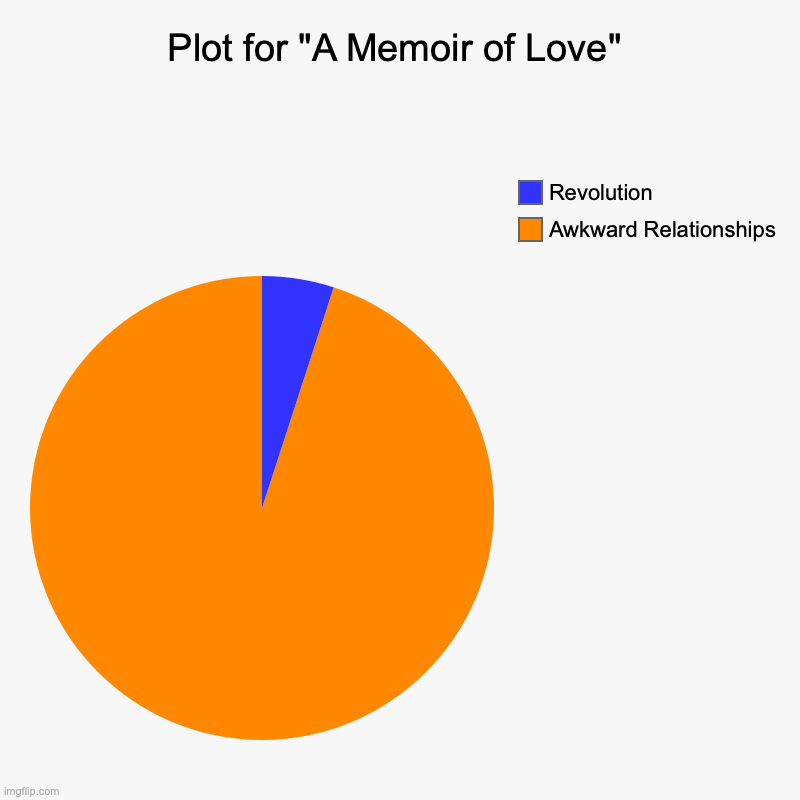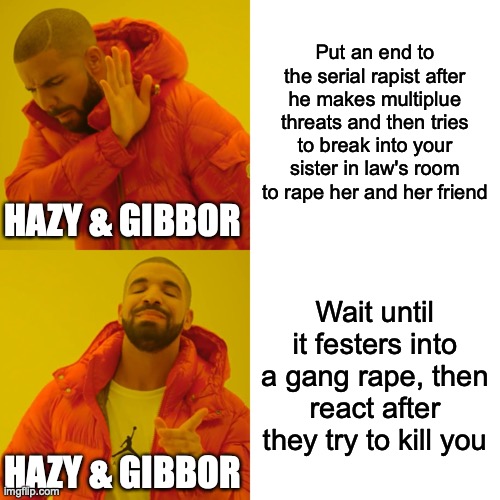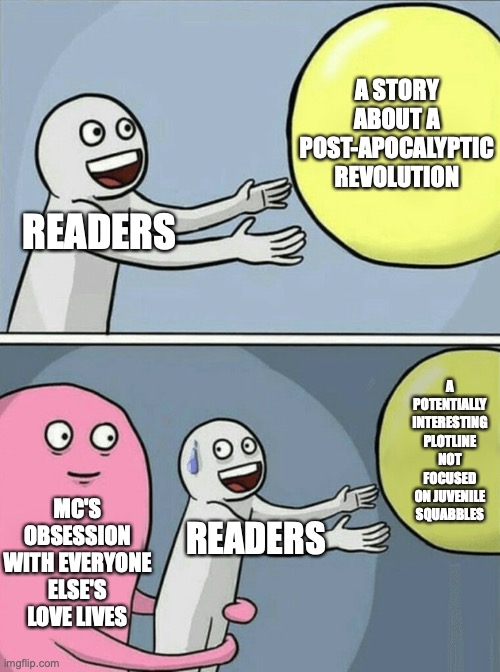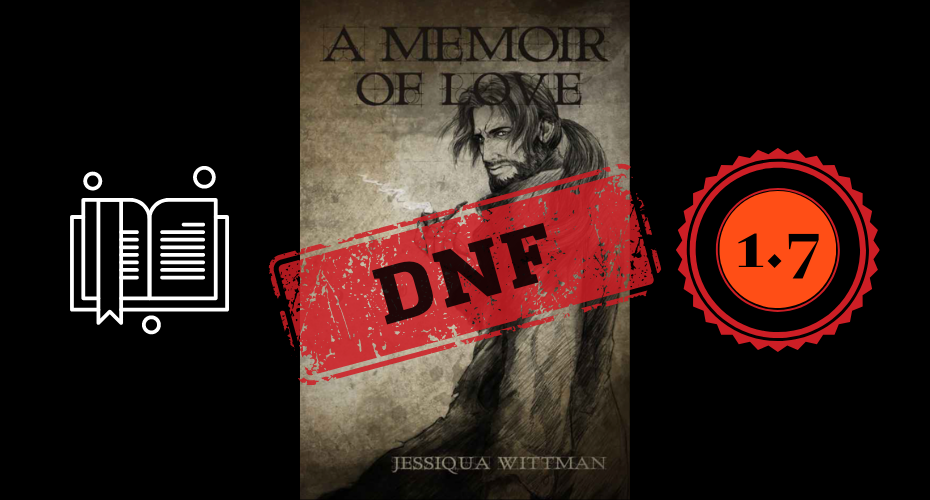
DNF — 1.7 stars
So, I’ve never done a DNF, nor a 2 star review before. This will be interesting.
Strap in, because this is going to be a long one.
DESCRIPTION:
I’m not entirely sure where or when I got this book (though I suspect it was through Lion and Lamb Ministries), but I’ve had it for at least 5 years. It’s been sitting on a shelf gathering dust, so I decided it was time to give it a go. The biggest reason it sat unread for so long was the page count, which sits at a whopping 1,000. There aren’t many books that have a good reason to be this long. Most should be edited and broken down into smaller arcs both for the sake of the reader and for the cleanliness of the story being told. I’ll come back for more on this page count later, but for now, let’s start from the beginning.
This is the description on the back of the book, and where the trouble starts:
Marna…
The year is 2143 C.E.
The place is an insignificant settler cell in the Damascus region. Consumed with unrest and divided by indecision, it is the perfect battlefield for the spiritual forces of a post-apocalyptic world.
The original inhabitants of this land were descendants of the ancient Hadadian kings of Damascus, but after the second Great War ended, the refugees from the destroyed population centers nearby decided to call this area their new home. The Hadadians fell easily to their following conquest. They were already weak from religious skirmishes within themselves, and the covetous refugees were far more advanced technology.
That was all sixty years ago. This year, 2143, our year, is the period everything is going to change for the forgotten kingdom. We, the multicultural grandchildren of that history, are ripe for a social revolution. Our settler’s senate council have proved themselves incompetent as leaders time and time again, and now war is looming with our European neighbor, Charn. Our last hope is to elect a Hadadian king to take the reins of our riotous people and rule like a man again.
Corruption loves company, and it never rests until anarchy reigns…
-A Memoir Of Love
What does this description make you think of? War, revolution, political intrigue, and a gritty, recovering society, perhaps? Would it shock you to learn that though I read 250 pages of this book, the main focus was not about a revolution, but instead on the love lives of four couples? War was mentioned here and there, and I’ll get more into that here in a minute, but at least 90% of this story was just about the relational ups and downs between a handful of characters.
Don’t get me wrong, I’m a sucker for a good love story or romantic subplots, but this book contained neither. These weren’t subplots, they were the main focus by a long shot.
POV CHOICES:
The narrative POV in this story makes little sense. Love is the perspective character for this story, but I wouldn’t really call her the main character. She is simply an observer to the relationship between her son Tov and adopted daughter Clare, between Alex and Raven, and the relationship between her friend Maia and her brother-in-law Hazel. Every now and then it dips into the relationship between her and her husband (whose name I have forgotten), or her own take on the situation at hand, but it always feels like a pail of cold water because you start to forget that Love is a real character after reading this for a while.
The only reason I’m rating this 2* instead of 1* is because I think the quality of the story could’ve been drastically improved just by making someone else the POV character. Tov, Clare, or Love’s husband could’ve made for a more limited, more personal, and therefore more engaging story. Love as a character is in everyone else’s business, but has no real business of her own. She is simply there like a news anchor reporting on the latest drama that frequently encircles their group.
The readers are given little information about Love or her goals, making her that much more disembodied, but Love isn’t the only one with goal problems. Despite knowing so much about each character’s love interests and interactions, I still have no idea what their mission is as a group. I don’t know why it’s so important to take down BenHadad, the stated villain of the story, aside from the fact that his men are kind of crappy and he wants to win the council’s favor (maybe?). This book tries to be about war and revolution, but if it had just let itself be a romance instead, or narrowed it down to focus on one romance instead of four, or just took more time to look at the world instead of zooming in so much on romantic attractions, it might have faired a little better.
But, that’s just my take.
STYLE:
This book is written as if it wants to be a journal, but at the same time, it feels like reading a novel, so it accomplishes neither atmosphere. The journalistic style is also used to try and excuse alarming quantities of exposition. I have almost no idea what was supposed to be happening with the history of this world, the political climate, or the mission/scope of the revolution in general because all of this was delivered in 2/3 page long info dumps at the beginning and then not discussed in detail again.
I was going to make a summary of this plot before I got into the review, but then I realized that I didn’t know enough about the plot to make one. All I really know for sure is that Tov likes Clare for reasons that are unclear, Clare was abused and is therefore emotional and kind of a drama queen train wreck, Love used to be an abused street urchin, Love’s husband and his brother Hazy used to be criminals but are now leaders of the revolution, Gibbor is a protective brother, and Maia is naive and emotional. I couldn’t really tell you if this “war” they were in was a literal fighting war or more of a political intrigue war, or why they were all so determined to do whatever amorphous thing they were setting out to do. I can, however, tell you every up and down of Hazy and Maia’s sometimes juvenile relationship.
90% of the book is about relationships. 25% was about Tov and Clare, while 60% was about Hazy and Maia, 5% about Love and her husband, and 5% was about Alex and Raven. The extra 5% was the occasional reminder about being chased by their political enemies and about living in a post-apocalyptic world, which felt more like the world returned to the 1910s? It was difficult to tell because much of the world-building was left fairly vague.
This comes back to the description of the book being misleading as to the content of the book. Yes, there are aspects of some kind of revolution going on, and there was some kind of apocalypse a few decades ago, but it’s all so far in the background or obscured by vaguery that you’d have to squint to get a clear picture of it.
On top of this, the style wants to be selectively omniscient, but is restrained to 1st limited, leading to some very strange retellings of events that Love was not present for. Every time something happens to a character that Love wasn’t around to see, that character goes into an almost photographic memory recall of exactly everything that happened. It’s bizarre how it goes from someone telling Love what happened, then slowly morphing into this cinematic retelling that sometimes breaks the POV as if you’re now going back in time and seeing what happened through their eyes instead of Love’s. Again I think this is because this book is trying to be someone’s journal and also a novel at the same time.
CHARACTERS:
1) Okay, I’ve talked about the plot and style problems enough. What about the story and the characters themselves? Well, I can say that after 250 pages, I wasn’t attached to any of them, which is not a good sign. They were consistent in their personalities, but they just didn’t feel human a lot of the time, or at least not felt in depth. Most of the emotional moments didn’t have enough build-up or explanation behind them, leaving the reactions of the characters lacking punch, feeling hollow, or sometimes feeling overly dramatic instead. Another problem that added to this affect was that so many of the moments were told rather than shown, especially when it came to Tov and Clare. There was so much drama and freaking out involved, but so little personal focus on why and how it was supposed to cause so much pain that it just left it feeling incomplete and mildly irritating.
I was tempted to skip over many of the interactions with Clare because as a reader, I had no reason to care about her plight, but was brought through overview descriptions of all of her freakouts. She was abused somehow by some guy named Iago that we don’t get any information on, has a tattoo from her time with him, and has abandonment problems. All of this was told, but it wasn’t done so in a way that made me sympathize with her.
Then, on the turn of a dime, she was suddenly “saved” by Tov’s kindness or something? I honestly don’t know for sure, but it definitely came off as an awkwardly forced religious moment needed to push the plot forwards. And just to make this clear, I am a Messianic, so this book is using my own faith, but that doesn’t mean that it’s done well. It’s a very common problem in religious fiction that aspects of the faith are forced in or made overly relevant in an attempt to push a message. There was quite a bit of that in here, but I’m at least happy to report that there were no Deus Ex Machina twists in this story that often accompany these kinds of books.
Just like political messaging can’t be shoved into good entertainment, neither can religion. Ideologies can be part of a story if it is sufficiently woven into the fabric of the story being told, but when it is inserted with the purpose of “making a point” or “being a focus”, it stands out every time, and not in a good way.
2) The women in this book, especially Maia, are often treated like children. This actually felt like it belonged in the beginning because it was more about women being the support structure of the family while the men lead, but as the circumstances of this group’s travel progressed, it felt more and more like they were treated as lessers. Maia is in her mid-twenties, yet she was often treated like she was a young teen by her older brother and by Love just because she wasn’t a married woman. Normally something like this could blend in with the cultural setting of the book, but given the biblical undertone to this treatment, it just stuck out as weird.
At one point, they even refused to tell Maia why she should be fearful of a pervert in town just because they didn’t want to say “serial rapist” or shock her sensibilities. She’s like twenty-eight years old, not ten, and that was very important contextual information. The fact that they withheld it for no good reason was just annoying more than anything, and this was the kind of behavior they always treated her with.
3) I actually started to grow fond of Hazel after his initial introduction. He seemed to be his own man, logical, and cared about his long-term impacts on those in the group. He was a little bitter about God and his past, sure, but at least it gave him some interesting potential character growth that didn’t just revolve around being dramatic. However… that fondness faded when they reached the town and he failed on multiple occasions to protect Maia and his sister-in-law, Love.
Supposedly, Hazy used to be a criminal and had killed before. A rough ’n tough background that was never made believable. Over the course of the week they were in town, several men made passes at Maia, which by now was his love interest, yet he never did anything substantial to stop them despite his assurances that he wouldn’t let anyone harm her. The serial rapist that I mentioned earlier, Elijah, even made boldfaced threats to rape her as revenge for Hazy having killed his brother some time back. This didn’t get much of a reaction from her so-called protector, and even once Elijah tried to break into the women’s room to rape them both, neither Hazy nor Maia’s brother Gibbor lifted a finger to put an end to this very serious threat.
This is where the book completely lost me. I could no longer get behind any of the protagonists, and the described asttributes of these people were just that – described. They weren’t real qualities, because making them real would’ve broken the direction the plot was headed in. Most of their decisions were half measured, and the rest of them were downright stupid. This was exemplified when they went to a theater where they again encountered Elijah and some of BenHadad’s crew who were on vacation(? Because enemies in a war remain on vacay when they come face to face with each other in town? Why they didn’t try to eliminate each other right then and there I’m not sure, but then again, I’m not even sure why or how these people were enemies in the first place).
All of the men made aggressive passes at the women, so they decided that it would be a great idea to leave the theater and their protectors in a huff to go have a girl chat in the ladies’ room… Surprise, surprise when the men immediately followed them and began to beat them and sexually harass them… because these characters were beginning to make very poor decisions on the regular by this point.
Again back to Elijah. Hazy and Gibbor, the two men that were again and again described as fierce protectors, did nothing in the face of rape threats. This was just a setup so that the book could have a horrifying tragedy in the plot work. To no one’s surprise, Elijah amassed some thugs and ambushed their group, then raped Maia right in front of everyone before Hazy finally fought back and killed him. It didn’t come off as a tragedy like the book intended it to though, it just came off as irritating because none of the characters really tried to do anything to prevent it, then half-heartedly lamented the trauma Maia went through.
Love’s quote from after this event was, “Of all the people in the world, why her?!” And the only thing that went through my head was, “Uh… because you refused to protect her like 5 times? I don’t understand where this confusion is coming from…?”
All of this was bad enough on Hazy’s record, but the final straw was the kiss he left her. Up to this point in the story, Maia had been very clear that she didn’t want intimate touch because she was keeping herself pure for marriage. This meant kisses on the lips as well, and Hazy knew that. However, after Maia was raped and carried back home to her bed, Hazy just couldn’t help it and did it anyways.
This was supposed to come off as sweet or romanitc… It did not, in fact, come off as sweet or romantic. It was low, and it was a gross violation of her trust on top of just having gone through trauma. This poor woman he said he loved gets *raped* in front of him, but then he takes the chance to kiss her immediately after this while she’s barely conscious? Not cute, not sweet, not endearing – just cringe. It would’ve been sweet if Hazy had tried to restore her modesty out of respect for those boundaries that had been so severely violated, but instead, he just did a less heinous version of what Elijah had done a few minutes prior.
This was just before the 250-page mark, so I got to set the book down soon after. However, I did do a round of flipping randomly through pages just to see if the tone ever shifted away from the relational dynamics and toward the war. The answer to that is, generally, no.
Pg. 586 – Women being used yet again, and then a recap episode from the beginning of the book
Pg. 387 – Tov and Clare’s relationship
Pg. 850 – Argument about everyone getting laid/fighting over Clare
Pg. 276 – Paying off a bounty
Pg. 452 – Accidentally saying they’re going to bed with each other, followed by uncomfortable deflection of the slip-up and weird not-flirting
Pg. 954 – Alex dumps Raven and consequentially gets him killed in the next paragraph…. Spoilers I guess.
Pg. 984 – Tov and Clare are married now.
NOT 1K PAGES?
Now, remember when I said this book was 1,000 pages long? Well, that’s because I have the paperback version. At the back of this book, the author states that large chunks of the narrative had to be removed from the Ebook version in order to squeeze it into the 1,000-page maximum for print. This book was already far too long as it was, but apparently, it had already been sliced up, which begs the question of just how many pages were in the original version.
These are the numbers listed on Goodreads for the paperback and ebook versions.
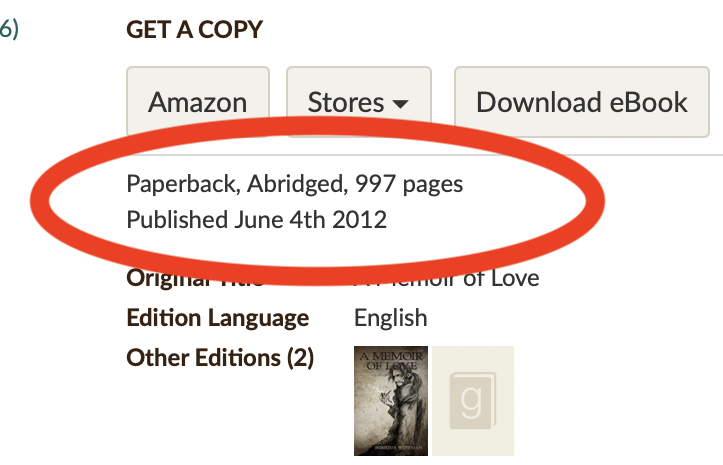
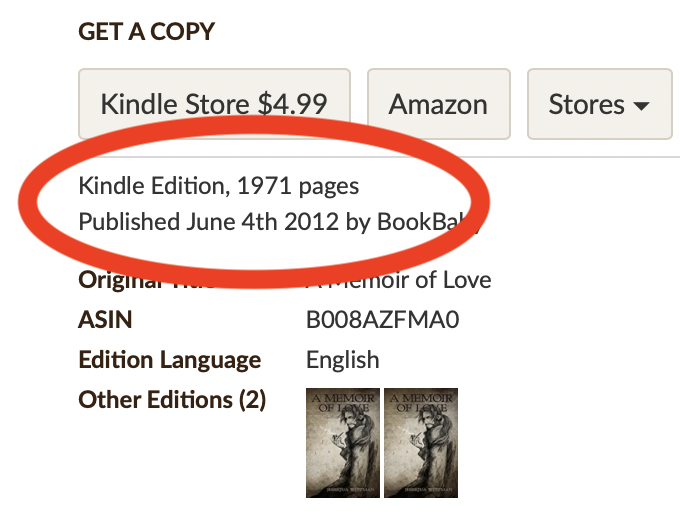
Conversion between paperback pages and ebook pages be what they may, this was still close to half of the book being erased. Perhaps this is where some of the problems came from, but I honestly doubt it.
All in all, this book’s description was misleading, I couldn’t connect with or root for the main characters, the world was vague, and the romantic conflicts were ceaseless.
The best part of this book was the title, because it was the most accurate part. A Memoir of Love. The main character’s name is Love, and all she journals about is other people’s love lives. The book’s description may have been misleading, but the title was surprisingly perfect.
